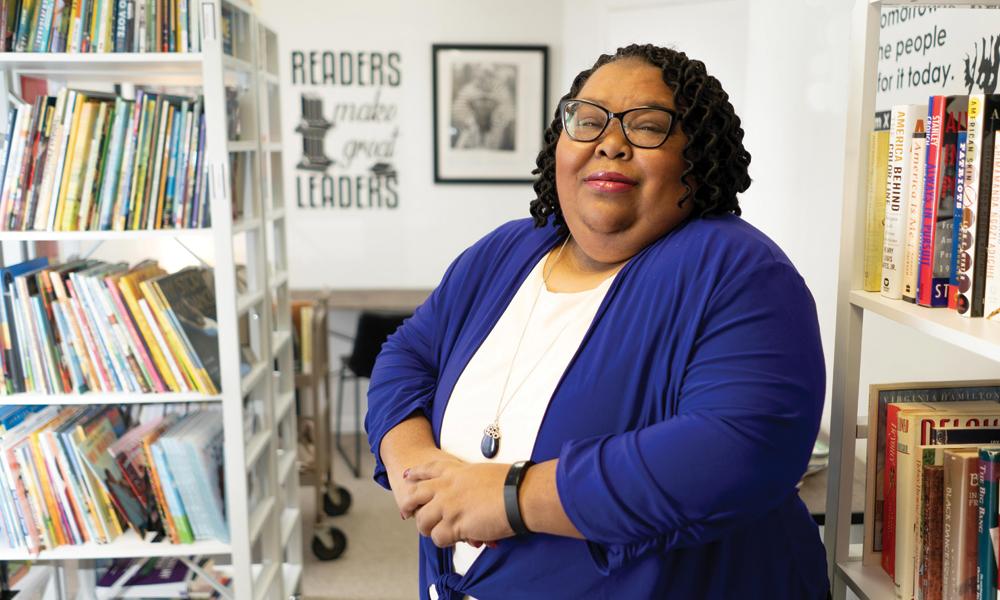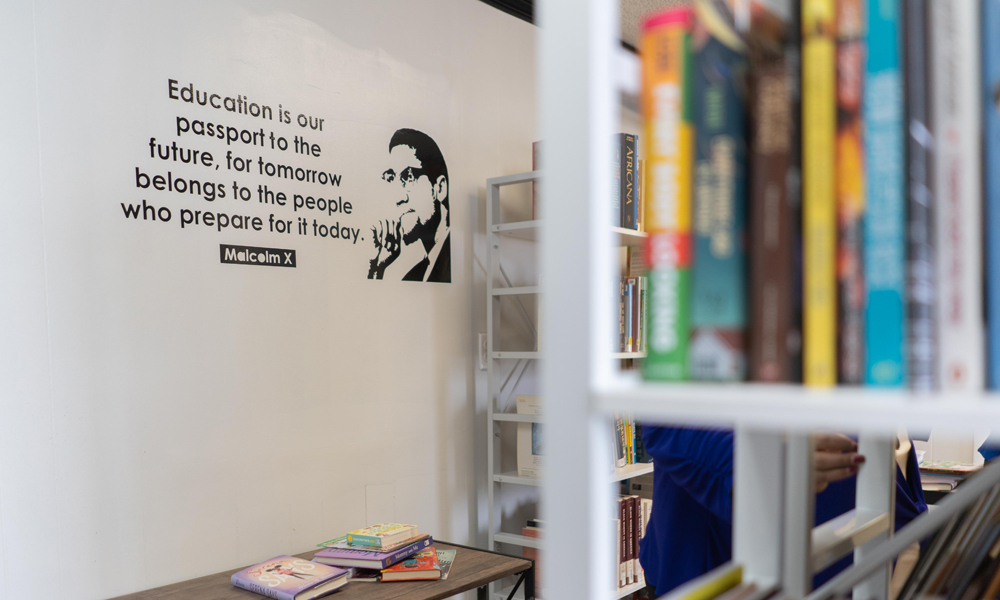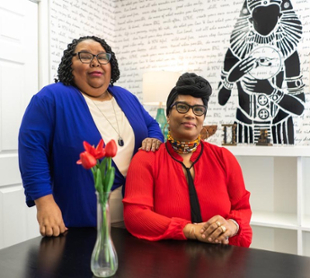A call to RISE
Alumna launches organization to lift Black voices
Featured Stories
SUMMARY: Chanda McGuffin’s (’93) activism brings awareness of the issues impacting the Black community and holds space for dialogue.
By Amy Crockett (’10)
Chanda McGuffin (’93) had all of the pieces in place. She and Sharon Fitz, the NAACP area chair for the Shenandoah Valley, had an executive team, committee chairs and 100 eager members ready to start an NAACP branch of Augusta County, Virginia, in 2017. But McGuffin’s mobilization fell apart — her attempt to charter the branch was denied by the national organization.
McGuffin and Fitz were more determined than ever to advance their cause after the deadly Unite the Right rally in Charlottesville, Virginia. The violence underscored the need for different voices to engage in conversation about ways to bridge the gap, and the word “RISE” came to mind like a premonition.
“The time was now and if not us, then who?” McGuffin said. She and Fitz answered the call in 2018, and put their years of experience together to start formulating and building their advocacy organization, RISE, to make space for Black voices and overcome systemic racism.
RISE partners with the community to bring awareness and unity to Waynesboro and beyond through its for-profit side, the nonprofit RISE Foundation and a political action committee. McGuffin, a Business and Marketing Education major, lends her professional background in banking and sales to RISE. She is the organization’s chief financial officer, and facilitates race relations, diversity training, conflict resolution and team-building workshops.
Fitz draws on her NAACP and lobbying expertise as RISE’s chief executive officer. RISE partners with mayors, politicians and community leaders to acknowledge, identify and discuss the problems facing the Black community. “We connect with businesses — everyone that we can possibly invite to the table — to make it real and something that people care about,” Fitz said.
As co-founders, McGuffin and Fitz care deeply about educating youth, which is where RISE believes social change begins. Its academic coaches offer after-school tutoring every Wednesday evening (pre-K to eighth grade), summer school special education support, Black-history lessons, civic engagement and more.
“In a period of a year, we [might] take 100 to 150 students, because they’re different students coming to different things,” McGuffin said. “Our anti-racism programming that we have, different students come. We also do things with the older kids where we’re looking at doing college tours and college planning.”
The RISE Foundation’s most powerful tool for learning and critical thinking is its library.
With more than 1,500 books in all genres, it is the first and largest Black library in Virginia. “It’s a significant amount,” McGuffin said. “Sharon and I haven’t had time to really sit down and even catalog all the books that are here. There’s still a lot of work to be done.”

|
McGuffin and Fitz have curated the library into a place of excitement where children feel inspired to see themselves reflected in the pages, a place where a reluctant reader becomes a writer. They organized the library by age and gender. “The reason why we do it that way is to show us a visual to say, ‘Ooh, we need more girl books or teenage books,’” McGuffin said.
A Richmond resident gifted the library its most prized collection: a donation of rare, out-of-print books. “Some of them go back 60 years or more. There’s a lot of historical books in there. [Author] Richard Wright is in there,” Fitz said. “They’re the kind of books that you wish you had nothing but time to read. When we picked them up, we were like kids in a candy store.”
McGuffin and Fitz said one of their challenges has been navigating the public misconception about their mission and being labeled as agitators.
Fitz said, “Everything that we do is with the heart and intention of restoring hope back into the Black community. Black people are the one group of people who are constantly being harmed in the worst ways. There’s a need for healing. Our children are receiving hate, hurt, sadness and struggle, and then they’re going into school systems that are not necessarily built for them.”

Another common assumption is that RISE is a Black-only group, but McGuffin and Fitz assure the Waynesboro space and its resources are for everyone. “Parents say, ‘Can white kids come to your program?’ Absolutely. We have white kids in our program. You just have to be OK with Jack and Jill looking like me,” Fitz said.
Members of RISE’s book club happen to be all white, and at the annual Women’s Summit on May 20-22, RISE will include male facilitators for the first time as well as Will Harris (’93) and Lolita Breckenridge (’93).
Now in its fourth year, the summit will draw women from all over the U.S. to the Best Western Conference Center in Waynesboro. Speakers touch on topics such as empowering women, healing, networking and business development. RISE also hosts the annual Community Stakeholder’s Conference, which is more focused on activism in the community and local outcomes.
In 2017, McGuffin ran for Waynesboro City Council and believes her Madison Experience helped her campaign. “It was the Black alumni who came through for me with the support and financial backing,” she said. “I did not win the election, but never say never to running again in 2022.”
When McGuffin steps foot on campus today, she instantly recognizes the familiar, purple-and-gold spirit that she felt 30 years ago. “JMU was the best four years of my life. If I could go back and relive it, I would in a heartbeat,” she said. Her twin, Channing McGuffin (’94), also attended JMU.
McGuffin remembers Diane Strawbridge (’80, ’02M), her academic adviser, as someone she could lean on to be heard. Byron Bullock (’89M), then-assistant dean of students, and Cheryl Plank, academic adviser, created a sense of family for McGuffin and other Black students at JMU. The Rev. Andrea Cornett-Scott, director of the peer helper program and instructor of African American religion, encouraged McGuffin to harness the fire within her — a spark that has always been a part of her identity.
In 2019, Fitz completed a six-month, paralegal certification at JMU. She sees a partnership opportunity for JMU Pre-Law and the Harrisonburg community. “The legal program could provide education outside of the school by delivering a Know Your Rights campaign,” Fitz said. She and McGuffin can also envision a collaboration between RISE and JMU by establishing a satellite office on campus.
But first, they are focused on expanding space at the group’s Waynesboro headquarters. Many of RISE’s programs fill to capacity, waitlisting students and volunteers. In September, McGuffin and Fitz look forward to growing their after-school program aimed at educating youth in the democratic process while teaching them how to use their voices and speak to politicians.
“We are building citizens,” Fitz said. “Everything leads back to the kids.”

